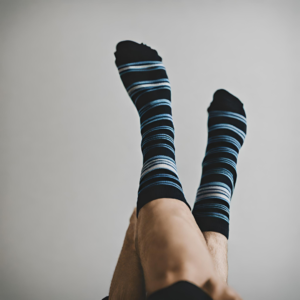
Wenjay Sung, DPM, a doctor of podiatric medicine and former consultant podiatrist for the LA Dodgers; and David Petrillo, a dermatological chemist and founder of the skincare line Perfect Image, share everything you need to know about wearing dirty socks.The truth about what happens if you wear dirty socks
“Clean socks help maintain foot hygiene, prevent fungal or bacterial infections, and keep your feet fresh and comfortable,” says Petrillo. “Dirty socks have the opposite effect.” And, he adds, not changing your socks can cause a cascade of problems.
The stank
First off, how do you feel about foot odour? Because the most immediate side effect of crusty footwear is a musty smell. Dr. Sung says the combination of sweat, bacteria, and dead skin cells on your feet can produce a uniquely foul smell when they’ve marinated inside a dirty sock.
While stinky feet on their own isn’t necessarily a health problem, it can cause problems if it grosses out people around you. Chances are you won’t notice it because we all become “nose blind” to our smell, thanks to what they call “sensory deprivation” in the field of psychology…but people around you will notice how fragrant you’ve become.
Pro tip: Dr. Sung says if constantly stinky feet plague you regardless of your sock status, try spraying a little spray-on deodorant on your feet before putting your socks on.
Foot infections
All the microorganisms in your dirty socks don’t just cause a smell—they can cause infections, too, Dr. Sung says. Bacteria like Staphylococcus and fungi like Trichophyton love the warm, moist condition of your dirty socks and thrive in that environment. Bacteria and fungi can cause infections ranging from mild itchy bumps to fungal infections, like athlete’s foot, to bacterial infections, like cellulitis, he says.
In rare cases, foot infections can become serious and even go septic if untreated.
Skin problems
Keeping the moisture, sweat, and bacteria trapped directly against your skin can cause irritation or even damage the skin on your feet, says Petrillo. This can cause or worsen conditions like blisters, rashes, eczema, dermatitis and open sores (which, in turn, make your feet more susceptible to infections).
Worsened allergies
If you suffer from environmental allergies, wearing dirty socks is one of the worst things you can do as you’re bringing the allergens in on your socks and then tracking them all over your house. “The socks’ presence of dirt, dust, or allergens can trigger allergic reactions or skin sensitivities,” Petrillo says.
Uncomfy feet
This “side effect” is definitely personal. Some people stay in dirty socks because they claim they’re more comfortable when they’re worn in. But many folks find dirty socks to be uncomfortable—itchy, irritating, and ill-fitting (a wet sock is a stretched-out sock).
How often should you change your socks?
Once a day is usually sufficient, say our experts. But, they add, your sock-changing frequency depends a lot on your body (how much you sweat during an average day and your susceptibility to infection) and your activity (working in an air-conditioned office is different from hitting the gym). “If you do anything that causes excessive sweating, you may need to change your socks more than once daily to maintain cleanliness and prevent discomfort,” says Dr. Sung.
If sweaty feet are an issue for you, Dr. Sung recommends purchasing special wicking athletic socks, designed to keep your feet dry.
Is it OK to put dirty socks back on clean feet?
What if you jumped in the gym shower with good intentions to change into clean clothes, but realize once you open your bag that you forgot your socks? Rewearing your sweaty, dirty socks isn’t a huge deal every once in a while, Dr. Sung says, but it is generally not recommended to put dirty socks back on if you can help it.
“Re-wearing dirty socks can exacerbate foot problems and make them worse, increasing the risk of foot infections or skin irritations,” he explains.
Source: thehealthy.com
Reader's opinions
